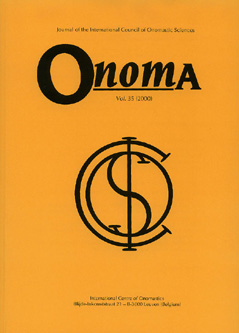 previous article in this issue previous article in this issue | next article in this issue  |

Preview first page |
Document Details : Title: The Importance of Being Onomastically Wilde in Shashi Tharoor's Riot Author(s): DA SILVA, Stephen Journal: Onoma Volume: 40 Date: 2005 Pages: 145-166 DOI: 10.2143/ONO.40.0.2033076 Abstract : In his novel Riot, the Indian novelist Shashi Tharoor strategically misreads Oscar Wilde’s onomastic politics: he uses the witty challenge that Wilde poses to the name of the father in The Importance of Being Earnest to attack Hindu fundamentalists’ investment in supposedly aboriginal names free from Muslim and colonial “contamination,” names that these fundamentalists associate with the fetishized figure of Rama, the mythic father of Hindutva nationalism. However, Tharoor cannily ignores Wilde’s conservative attempt, both in De Profundis and at his trials, to legitimate his forbidden “love that dare not speak its name,” by affiliating it with a catalog of patriarchal sponsors, an attempt that runs counter to the Wildean strategies that Tharoor celebrates in Riot. Thus, while the novel dramatizes the instability and multivalence of all names, it ironically treats the name “Wilde” monolithically, predictably associating this signifier with the subversive onomastic politics of The Importance of Being Earnest. Dans son roman Riot, le romancier indien Shashi Tharoor interprète mal la politique onomastique d’Oscar Wilde: il emploie le défi plein d’esprit que Wilde pose pour le nom du père dans The Importance of Being Earnest, pour attaquer l’investissement des fondamentalistes hindous dans des noms soi-disant aborigènes, libres de toute «contamination» musulmane et coloniale, noms que les fondamentalistes associent à la figure fétichisée de Rama, le père mythique du nationalisme hindou. Cependant, Tharoor ignore par ruse la modeste tentative de Wilde, à la fois dans le De Profundis et dans ses essais, de légitimer son «amour qui n’ose pas parler en son nom» interdit, en l’affiliant à un catalogue de parrains patriarcaux, une tentative qui va contre les stratégies de Wilde que Tharoor célèbre dans Riot. Ainsi, pendant que le roman adapte l’instabilité et la polyvalence de tous les noms, il traite ironiquement le nom de «Wilde» de façon monolithique, en associant, comme on pouvait le prévoir, ce signifiant avec la politique onomastique subversive de The Importance of Being Earnest. In seiner Novelle Riot versteht der indische Novelist Shashi Tharoor die Namenpolitik Oscar Wildes absichtlich falsch: Er verwendet die geistreiche Herausforderung, die Wilde in den Namen des Vaters in The Importance of Being Earnest legt, um die Absicht der Hindu-Fundamentalisten, erfundene einheimische Namen, die von muslimischer und kolonialer „Verunreinigung“ frei sind, zu attackieren – Namen, die die Fundamentalisten mit der zum Fetisch gemachten Gestalt des Rama, des mystischen Vaters des Hindutva-Nationalismus, verbinden. Tharoor ignoriert jedoch sorgsam Wildes vorsichtigen Versuch, sowohl in De Profundis als auch bei seinen Prozessen, die verbotene „Liebe, die nicht wagt, den Namen zu nennen“ zu legitimieren, indem er ihn mit einem Katalog patriarchalischer Sponsoren verbindet, ein Versuch, der der Strategie Wildes, die Tharoor in Riot zelebriert, zuwider läuft. Während also die Novelle die Instabilität oder Multivalenz aller Namen dramatisiert, behandelt sie in ironischer Weise den Namen „Wilde“ monolithisch, und verbindet vorhersagbar diesen Bedeutungsträger mit der subversiven Namenpolitik in The Importance of Being Earnest. |
|


